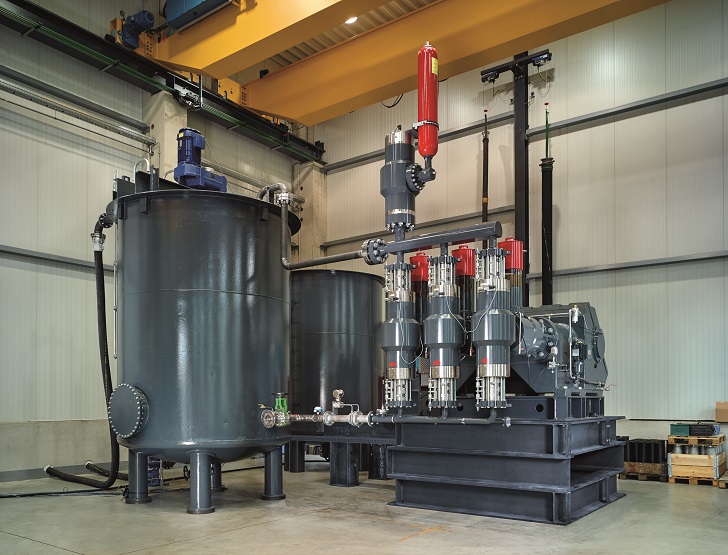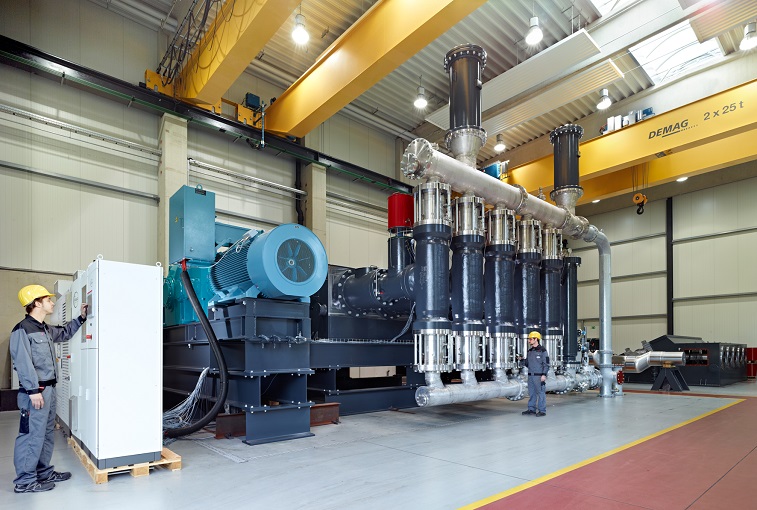

Good pump design can be challenged by the nature of the media involved. Here we discover how German specialist Feluwa has developed a system capable of transporting even the toughest materials efficiently while keeping operating costs to a minimum.
Ask an outsider what the main function of a pump may be and they are likely to say that their primary use is to ensure water is controlled effectively, for example in typical domestic uses such as a washing machine or car.
But pumps are not just about water as in many industries they are required to operate in extremely harsh environments such as oil refineries, sewage plants or mines. This means the media being pumped can be viscous such as slurry and contain dry and potentially corrosive material.
Critical choice In such cases the choice of pump is critical to ensure the successful removal of the material required. Pick the wrong type and the media can damage the pump, adding to operating costs and time required to carry out the operation.
Feluwa specialises in the design, fabrication and worldwide service of pumps for difficult media. Now part of the ARCA Flow Group, it is backed by more than 100 years of experience in the field which has ultimately led to the development of the Multisafe double hose-diaphragm pump.
This is a hermetically sealed, leak-proof, oscillating displacement pump. Two hose-diaphragms, arranged one inside the other, are fixed in the pump head. These hose-diaphragms enclose the medium ensuring double separation of the hydraulic drive end.
Linear flow The pump was specifically designed to be able to transport abrasive, aggressive and toxic media across a wide range of industries from mining to food production. Its construction means that unlike traditional piston pumps, the matter being transported has a linear flow and never comes into contact with the metal parts of the pump in the chamber, ensuring its essential structure remains unaffected by the nature of the material.
Feluwa customers see this as a key advantage of the Multisafe design. In a traditional pump, if the fluids come into contact with the piston and seals, then the lifetime of the seals is reduced and the cost of maintenance and parts escalates as a result.
With the Multisafe system there are only three wearing parts in the pump. Instead of compressed air with its pressure limitation, a crank shaft is used to displace the volume. The piston acts on a hydraulic liquid which transfers the pressure around the double-hose-diaphragm. This then separates the actuation liquid which lubricates the moving parts of the pump and the media to be pumped.
The pumping action is initiated by displacement of the piston / plunger driven by the crank shaft. The diaphragm then separates the media from the hydraulic liquid.
Unlike peristaltic hose pumps with mechanical drive, the hose-diaphragms of the Multisafe pump are not squeezed but are subject to a pulsating action, comparable with that of a human vein. Feluwa uses a modular system, building double acting pumps with two and four pump heads as well as single acting pumps with one, three and five pump heads.
Quintuplex design The system uses a quintuplex design incorporating five independent plungers in parallel. Depending on the viscosity of the media, flow can be operated from top to bottom if necessary, literally turning the traditional pumping principle upside down. This is achieved by making use of gravity to prevent solids from settling and so clogging the operation.
Every pump is fitted with acoustic sensors which continually monitor its condition to ensure early signs of wear are detected. Should one of the hose-diaphragms leak, the second one ensures that the pump can continue to operate until the system allows for shut down and repair.
But this does not happen often as the hose-diaphragms have a service life of more than 20,000 hours, keeping the cost of spare parts to a minimum. Gearboxes are engineered with anti-friction bearings giving a minimum service life of 100,000 hours and each pump is built to last for 30 years. In fact, Feluwa calculates the annual cost of spares amounts to just two per cent of the purchase cost of the pump.
Feluwa tailors its Multisafe pumps to the needs of individual clients, depending on their requirements and has more than 1,000 pumps operating worldwide. In 2012 it produced the world’s biggest double hose-diaphragm pump consisting of the quintuplex design with five pump heads weighing in at 150 tonnes.
Big projects Managing Director Rudolf Gänsl explained: “We now have four of these pumps running in Mexico. It was decided from the outset that even though we are a smaller player in the industry, we would get involved with the big projects on the back of our technology and service.”
While making bespoke adaptations suited to a client’s needs, the modular system of the pumps remains similar. A typical cast iron construction can reach pressures of 110 bar while fabricated steel can go up to 400 bar and volumes up to 1,000m³/h.
At the other end of the scale, the most recent addition to the range, the Ecotrans Multisafe Pump, is designed for low pressures of up to 16 bar and up to 20m³/h – for the small EcoTrans only.
This type of pump is particularly used for critical applications such as mechanically abrasive and chemically aggressive liquids as well as highly viscous media of different consistencies which can include particles. Depending on the respective medium, the dry-matter content can be up to 80 per cent. Typical applications include the metering and feeding of filter presses, reactors and spray driers.
The company’s biggest market is the energy sector, primarily in the fields of coal and gas gasification and treatment where it also has wide experience in the chemical sector and treatment where through wet oxidation, the slurry can be removed before being burned and turned into energy.
Product development Feluwa has about 140 staff with some committed entirely to product development and testing. This is a key area for the business as it ensures the company is continually ahead of the curve when it comes to new technology and its application in the field.
About 5% of the company’s 30m euro turnover is dedicated to these areas alone. Feluwa also encourages students to help its team come up with new ideas. The challenge is then to get those ideas accepted by the client.
Mr Gänsl said: “It is a very conservative industry. We have worked with clients for years but we must build up enough trust with them to allow us to try something new. At the same time, we cannot afford to stand still.”
Testing is a key area of and quality control for Feluwa. A slurry test rig featuring a Multisafe pump can handle, for example, up to 14 tons of iron ore mixed with other materials to make a highly abrasive compound that is then pumped at an operating pressure of up to 250 bar with a volume flow of 14 m³/h.
The system is completed by a feed tank with agitator, cooler and a web-based diagnostic system, which allows for 24-hour operation of the test rig. Customers can then see the capability of the product at first hand and examine the effect of different kinds of media on wearing parts like valve seats and body.
“If you can prove that a pump works at a small scale, then it is reasonable to assume that you can scale up effectively,” added Mr Gänsl.“Customers prefer it if they can see the testing for themselves and to be there to witness the experience as well as the technology at first hand.”
Clients have included a Russian refinery which required a pump to process a slurry of Isobutanol cobalt carbonate particles and Isobutanol. The slurry must be pumped with pressures up to 320 bar into a reactor within the process chain.
Coal gasification Meanwhile, Chinese coal gasification plants uses Feluwa pumps to remove coal slurry mixed with oil, benzene and toluol where particle sizes of up to 6mm pose a particular challenge. To avoid sedimentation, pumps in down-flow configuration were used. The slurry flows from top to bottom. Such has been the success of the operation that a follow-up order was quickly placed. Important market
China has become an important market for Feluwa and its technology was at the heart of a world record set by a Chinese client which saw it operating for an unprecedented 511 days continuously. Coal gasification systems essentially depend on the efficiency and dependability of the pumping systems that are used to feed the coal slurry under high pressure into the gasifiers.
One new area for the company is food which, although the technology required is much smaller, should pose no problems for double hose-diaphragm pumps.
Feluwa is servicing a genuinely global market, exporting to China, South Africa, Russia and Australia, although Mr Gänsl would like to do more business on home soil in Germany which accounts for just 10 per cent of current sales but development is continuous as it must be in such a competitive industry.
Mr Gänsl added: “We are always looking to the future. It is always a challenging market but we believe we are competing in the Champions League of pump manufacturers.”





